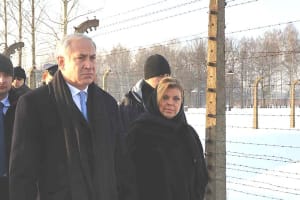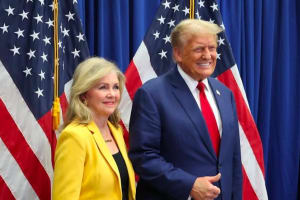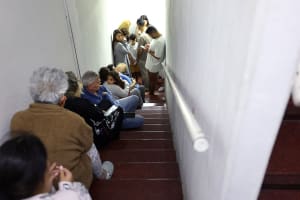Antisemitism called out inside BBC as a result of Gaza War reporting

Biased Israel reporting, perhaps, but racism at work toward Jewish employees? This is not something that the BBC has been accused of… until recently.
“Anti-Semitism exists in the newsrooms of Britain’s public service broadcaster,” an experienced BBC staff member recently told the Daily Telegraph. “It has for years and remains prevalent today, exacerbated by events since October 7.”
After a formal letter from Jewish employees at the BBC was sidelined by management earlier this year, the whistleblower decided to expose the problem, saying antisemitism had become ‘normalized’ since the brutal Hamas attacks of Oct. 7, 2023.
While the anonymous Jewish employee did not divulge the worst examples to protect their identity, they did reference several instances where colleagues' remarks and conversations were considered inappropriate for a professional workplace.
“On yet another occasion, while at the coffee station with a journalist, they felt the need to say to my face, ‘My sympathies lie with the Palestinians,’” the whistleblower told the Telegraph.
“I don’t even recall having a discussion leading up to it but it was in effect throwing down a gauntlet, a kind of squaring up to a Jew in the office as if to say, ‘Israel is simply wrong and I feel so strongly about it that I’m letting you know.’”
“Would anyone say to an Indian colleague, ‘My sympathies lie with Pakistan,’ or vice-versa? Of course not, it would be unthinkable,” the BBC staff member added.
In June, BBC Chairman Samir Shah received a letter signed by more than 200 mainly Jewish staff members, contractors, contributors and suppliers. They wrote that antisemitism is “systemic” at the corporation and that “Jews don’t count,” since so many complaints had been dismissed or marginalized. In their formal letter, the signatories provided 30 pages of personal testimonies.
After Shah refused to launch an investigation into the claims of antisemitism, both on and off screen, many prominent artists began speaking out and continuing the exchange of letters with BBC department heads. Some spoke anonymously to the Jewish Chronicle.
“Every week it gets a little harder being a Jew at the BBC,” said one employee. “Harder to sit in the office and listen to colleagues discussing their very personal views about the war in Gaza and (the) attacks by Hezbollah on Israel.
“It is harder listening, watching and reading the loaded output about events in the Middle East and colleagues’ partial and often offensive social media posts, and harder to go home at night and speak to friends and family who hold me responsible for the BBC contributing to the rise in antisemitism in the UK.”
Another said, “The hardest thing of all is seeing how BBC stories are adding to antisemitism – you can see it in the social media responses to our stories. And there is nothing we can do about it.”
The signatories to the letter said that Shah’s weak response was “an example of the gaslighting of the entire Jewish community.”
Former BBC employees have corroborated these claims. A non-Jewish former BBC journalist told ALL ISRAEL NEWS that “the prevailing hostility [within the workplace] towards Zionism did cross lines and tended to filter out any narrative sympathetic to the idea of a Jewish homeland” and said the whistleblower’s report was “sadly accurate.”
Some have suggested that the BBC's coverage of the Israel-Hamas war has negatively influenced the media environment and the broader UK atmosphere toward British Jews and supporters of Israel.
Danny Cohen, a former BBC television director, and Baroness Deech, a former BBC governor, published a report criticizing the BBC’s reporting during the first 11 months of the Hamas-Israel war. The report concluded that “the BBC is not merely careless in its reporting of the war in Gaza. The 'mistakes' are almost always in the anti-Israel direction…"
“Whenever the corporation is faced with the choice of whose account or narrative to believe, it seldom points in Israel’s direction. For Hamas in this war, proof is rarely necessary. For the IDF and Israel, proof is rarely enough.”
In May 2024, the BBC had already issued 80 corrections to its Gaza war coverage. Cohen wrote in The Telegraph, “Something is going badly wrong. Mistakes don’t happen 80 times.”
Commenting on Cohen’s analysis, the UK Chief Rabbi Ephraim Mirvis wrote that media reporting has been inextricably linked to the hostile treatment received by some British Jewish citizens.
“The data could not be clearer: wherever sustained misinformation and demonization of Israel is found, incidents of anti-Jewish racism surge. That’s one of the reasons why the accuracy and objectivity of our national broadcaster is so important for the Jewish community.”
In addition, the Asserson Report into the BBC’s coverage of the Israel-Hamas war, published in early September, revealed 1,553 breaches of the corporation’s own guidelines, including impartiality and accuracy. These findings only covered a four-month period, beginning on Oct. 7, 2023.
The latest report from the Henry Jackson Society examines the BBC and other media outlets in its fact-checking of the inflated numbers promoted by the Iranian-backed Hamas terrorists.
The report revealed that the media has largely acted as a mouthpiece for Hamas, particularly in amplifying inflated and inaccurate Gaza death tolls reported over the past 14-plus months.
BBC coverage has also been closely monitored by CAMERA-UK, with the watchdog’s co-editor, Adam Levick, recently providing an update to online radio journalist Paul Calvert.
Click below to listen to the interview.

The All Israel News Staff is a team of journalists in Israel.
You might also like to read this:















